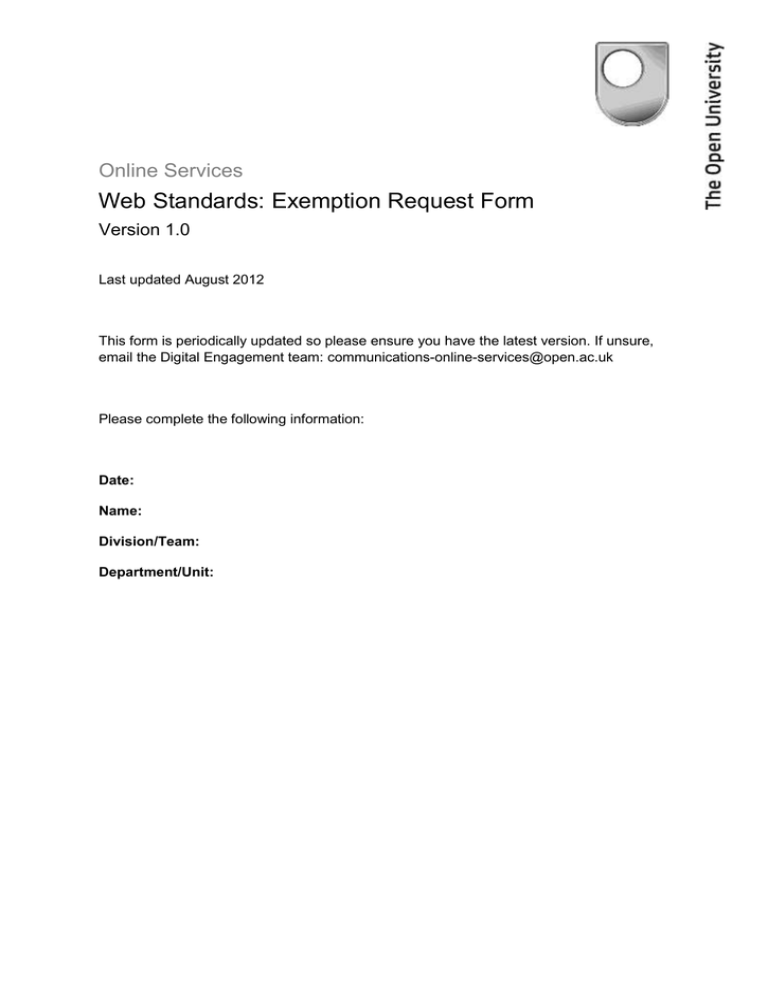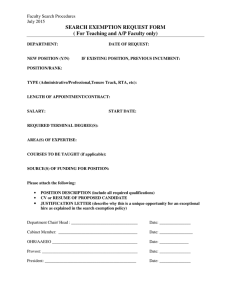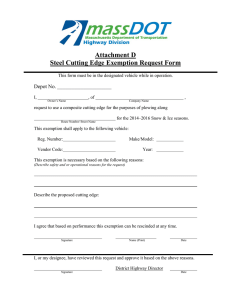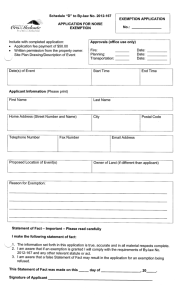Download the exemption request form
advertisement

Online Services Web Standards: Exemption Request Form Version 1.0 Last updated August 2012 This form is periodically updated so please ensure you have the latest version. If unsure, email the Digital Engagement team: communications-online-services@open.ac.uk Please complete the following information: Date: Name: Division/Team: Department/Unit: The Open University Online services August 2012 1 Why and how must you apply for an exemption? 1.1 Standards and guidelines are defined by working groups of representatives across the University and approved by the Digital Engagement team and the Directors of Communications and LTS, and the Chief Information Officer. 1.2 You are expected to adhere to all standards and guidelines and to be conversant with current standards and guidelines, which can be found at: http://www8.open.ac.uk/about/web-standards 1.3 There is therefore an expectation from students, external suppliers and the general public that the OU complies with these standards and guidelines. 1.4 If you are in any doubt about the interpretation of a standard, please consult the working group responsible for the standard. You can find their contact details on the web standards site at http://www8.open.ac.uk/about/web-standards/governance/working-groups 1.5 You apply for an exception by completing and returning this form to the Digital Engagement team in the Communications Unit at the following email address: communications-onlineservices@open.ac.uk. 1.6 The team will liaise with the working group responsible for the standard to assess whether it should be accepted or rejected. 2 Justifying your application for exemption 2.1 The burden of proof is upon the applicant, whose application can be supported only by submitted written evidence. Details that you fail to submit can however be used to decline an application. 2.2 Exemptions from standards require a thorough, rational justification. 2.3 You might argue: 2.3.1 that a standard conflicts with your editorial proposition; that is, you cannot achieve what you want for your audience without breaking a standard. 2.3.2 that what you propose to do, does not undermine the purpose or intent of the standard. 2.3.3 that a standard is wrong, inadequate, or out of date. If so, what should the standard be, and why? 2.4 It is not enough to want an exemption for the sake of using a new technology, or to avoid supporting certain technologies. In all cases, you must therefore support your application with good reasons, making a clear case for an exemption. 3 Decisions regarding exemptions 3.1 The working group and DE team undertakes to make a decision on your application within 5 working days. 3.2 If you are not satisfied with the group and DE team’s decision you can submit an appeal to the Digital Standards Sign-Off Group. Page: 2 The Open University 4 Online services August 2012 Your application Please provide the following (minimum) information to support your application for exemption. 1. State the standard(s) from which you require an exemption and cite the specific clause(s) or paragraph(s) from the standard. [insert information here] 2. State the name, URL (if available) and editorial proposition 1 of the project requiring an exemption. [insert information here] 3. State your reasons for requiring an exemption, specifically explaining how the exemption will allow an improved user experience and support the editorial proposition, supporting your argument with evidence. [insert information here] 1 This is the main purpose of the site; that is, what it is aiming to do and what information it is aiming to convey, regardless of how that is achieved. Page: 3 Online services The Open University August 2012 4. State all the issues resulting from non-compliance, particularly any issues relating to accessibility and data protection, explaining how you intend to deal with and manage these issues. [insert information here] Document control Version Date Author Comment 0.1 26/07/12 Victoria Jolliffe First draft Page: 4


